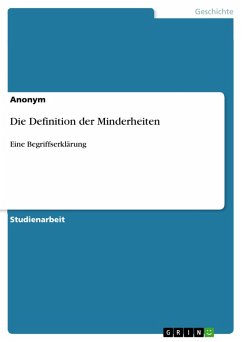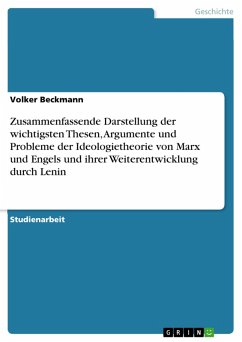
A Definition of History. What is Historicism? (eBook, PDF)
Sofort per Download lieferbar
Statt: 9,99 €**
5,99 €
inkl. MwSt. und vom Verlag festgesetzt.
**Preis der gedruckten Ausgabe (Broschiertes Buch)
Alle Infos zum eBook verschenkenWeitere Ausgaben:

PAYBACK Punkte
0 °P sammeln!
Essay aus dem Jahr 2008 im Fachbereich Geschichte - Allgemeines, , Sprache: Deutsch, Abstract: It seems that a definition of history should include all things that have ever happened. That definition would include all physical events and occurrences. It would also seem that the definition of history would be synonymous with a definition of the past-the sum total of all things that have ever happened. But Williams points out that the past is not history. Things may have happened in the past that were not observed or recorded. History is, therefore, only a subset of the past. As a discipline, hi...
Essay aus dem Jahr 2008 im Fachbereich Geschichte - Allgemeines, , Sprache: Deutsch, Abstract: It seems that a definition of history should include all things that have ever happened. That definition would include all physical events and occurrences. It would also seem that the definition of history would be synonymous with a definition of the past-the sum total of all things that have ever happened. But Williams points out that the past is not history. Things may have happened in the past that were not observed or recorded. History is, therefore, only a subset of the past. As a discipline, history is a study of the past, but it will only reveal a portion of the past, and should be done so as objectively as possible. There have been many different approaches to the study of history. Idealism is the belief that history can be described in terms of ideas--what people thought and the intent behind their actions. The idealists of the mid- to late-1800s cared not only about events, but on what those events meant. Attaching meaning is not easy, and entails problems associated with interpretation if those interpretations are biased or incomplete. The problem with this viewpoint is that we can't always know what was intended. Idealism can be limiting in accurately portraying events as they really happened. Historicism is another approach by which to describe history. Its premise is that "the autonomy of the past must be respected". Each age has its own values, and events should be described within the context of those values. One of the problems with historicism is that its approach is tantamount to legitimization of events by respecting the values of the time. That approach inhibits our ability to fully learn from mistakes of the past. Williams stated that some of [it] has nurtured totalitarianism. When meaning takes on a life of its own and affects viewpoints that lead to ideologies that lead to atrocious actions, then you have what humanity experienced with Nazi Germany.
Dieser Download kann aus rechtlichen Gründen nur mit Rechnungsadresse in A, B, BG, CY, CZ, D, DK, EW, E, FIN, F, GR, HR, H, IRL, I, LT, L, LR, M, NL, PL, P, R, S, SLO, SK ausgeliefert werden.













